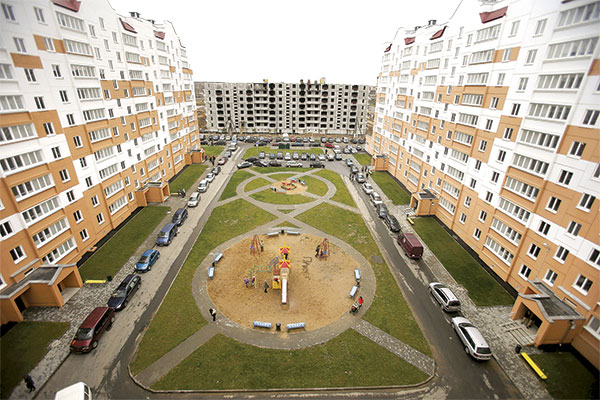
Mismatch between demand and supply has clear ‘numeric outlines’
Buyers are dictating their preferences, including financial, while sellers are reluctant to compromise on price. A common advert reads: ‘New apartment for sale, with improved lay-out and standard fittings, non-corner site, with two apartments per floor. Overlooking parking and inner courtyard. Near public transport, school, kindergarten, shopping centres and wonderful nature! $1,380 per square metre!’
The mismatch of supply and demand is already obvious, with just 2,000 apartments changing hands in Minsk over the first quarter of 2015: down 15 percent on last year. Regional centres are even more ‘stagnant’, with sales down by a third on 2014. Since salaries aren’t growing, only those desperate to buy are entering the market. Others await better times, with sellers hoping demand will rise and buyers hopeful of a ‘trough’.
Yuri Zharkov, the managing partner of ViVa Invest Group and Director of the Viva Konsalt Real Estate Agency, comments, “Today, even those who’ve been long planning to buy an apartment are waiting for a fall in prices. They have the money but are convinced that they’ll see property prices drop in a few months’ time, in July or August.”
As salaries plateau, purchasing power falls and businesses tend to falter as a result of reduced consumption. Those involved in production, especially, see fewer sales and, unsurprisingly, there is a knock-on effect on the property market. Nevertheless, builders continue to construct accommodation, and real estate companies behind new housing are reducing their prices, to attract solvent consumers. As building material prices were not indexed to the devaluation of the national currency, the cost price of building has fallen (in US Dollar equivalent). Of course, in reducing prices, profits that would be used to finance further projects are lost. The market also lacks future building sites, besides money to develop them, so there may be a future period in which new buildings are scarce.

The point of equilibrium may arrive by 2021, settling at a price of about $2,000 per square metre for a panel house of average level (currently priced at $1,000). The explanation is simple. To build from scratch, land must be purchased at auction, which is no cheap venture. Minsk lacks vacant lots, and all new houses ‘need’ underground parking these days: an expense always passed on to the buyer. Meanwhile, infrastructure is usually lacking in new residential districts, requiring private builders to pay for connection to services: another expense conveyed to buyers. The outlook is for little new housing in Minsk, and that created being certainly expensive.
In July-August, house prices should ‘trough’, but rise again in September: even more significantly by the end of the year. Nikolay Prostolupov, the Chairman of the Council of the Belarusian Real Estate Association, predicts, “We are about to see buyer activity fall, alongside prices, with the trend remaining until the new year if no administrative measures are taken. With the average monthly salary standing at Br6 million, it’s impossible to call Br18-20 million per square metre affordable. A panel box home built by MAPID OJSC costs $550-600 per square metre, so why does it sell for $1,000-1,100? Simply, builders are being obliged to finance infrastructure usually paid for from the city budget: roads, water pipes and various other networks (such as we pay for with our taxes). In the current situation it’s too optimistic to expect the budget to undertake this expense.”
By Aelita Syulzhina











